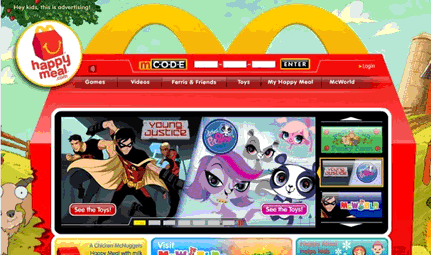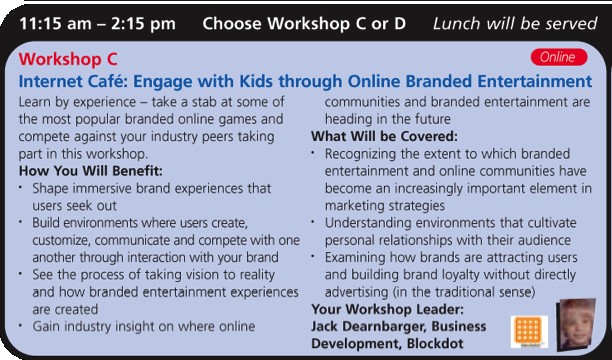 Children as young as four are being targeted by internet advertisers and often the interaction with the children is unmediated by parents or teachers. UK advertising agency Saatchi & Saatchi noted: “Interactive technology is at the forefront of kid culture, allowing us to enter into contemporary kid life and communicate with them in an environment they call their own.”
Children as young as four are being targeted by internet advertisers and often the interaction with the children is unmediated by parents or teachers. UK advertising agency Saatchi & Saatchi noted: “Interactive technology is at the forefront of kid culture, allowing us to enter into contemporary kid life and communicate with them in an environment they call their own.”
Advertisements appear on banners at the top of websites, on scroll down frames at the side of the windows, and unbidden on pop-up windows. There are even animated product “spokescharacters” to interact with the children and develop relationships with them so that they can be persuaded to buy something.
 Internet advertising is particularly effective at targeting children because they are less able to tell the difference between advertisements and other content. They are more likely, for example, to click on banner ads thinking they are part of the website, offering information or entertainment, and they tend not to take any notice of annotations like “AD” or “PAID” that are supposed to indicate advertisements.
Internet advertising is particularly effective at targeting children because they are less able to tell the difference between advertisements and other content. They are more likely, for example, to click on banner ads thinking they are part of the website, offering information or entertainment, and they tend not to take any notice of annotations like “AD” or “PAID” that are supposed to indicate advertisements.
 The meagre regulations that television advertising is subject to don’t apply to the internet. Advertisers and marketers are free to merge content with advertising and exploit children with few if any limits. The ads on internet sites are often integrated with the other content of the internet site – games and competitions, music downloads, video clips, discount coupons, online chat rooms, free email, club membership, gossip, fashion tips or advice – which is designed to keep the children engrossed in play for hours at a time and to keep them coming back. Marketers and advertisers are “fundamentally reshaping the digital culture, creating new hybrid forms that blend communications, content and commerce”.
The meagre regulations that television advertising is subject to don’t apply to the internet. Advertisers and marketers are free to merge content with advertising and exploit children with few if any limits. The ads on internet sites are often integrated with the other content of the internet site – games and competitions, music downloads, video clips, discount coupons, online chat rooms, free email, club membership, gossip, fashion tips or advice – which is designed to keep the children engrossed in play for hours at a time and to keep them coming back. Marketers and advertisers are “fundamentally reshaping the digital culture, creating new hybrid forms that blend communications, content and commerce”.
 For example the Family Education Network, a division of Pearson Education, runs FunBrain.com and FEkids.com websites for children with “the hottest collections of games and activities” on the internet. It offers advertisers access to “over 7.5 million unique kids targeted by age and gender”, three quarters of whom are between 6 and 12 years old.
For example the Family Education Network, a division of Pearson Education, runs FunBrain.com and FEkids.com websites for children with “the hottest collections of games and activities” on the internet. It offers advertisers access to “over 7.5 million unique kids targeted by age and gender”, three quarters of whom are between 6 and 12 years old.
Three quarters of food manufacturers advertising on the internet have designed websites specifically for children, some for very young children; many others have websites that have a children’s section. The address of the website is often given on the product packaging. Most of these websites are plastered with brand logos and advertising claims and include links to other food related sites. On some websites children are encouraged to view television advertisements for the product. On others they are offered branded downloads such as music clips, mobile phone ringtone, desktop wallpaper, screensavers.

In 2012 MacDonalds was found guilty, by the Advertising Standards Bureau, of breaching a voluntary industry code by promoting unhealthy food choices to children using characters and interactive games on its Happy Meal website.